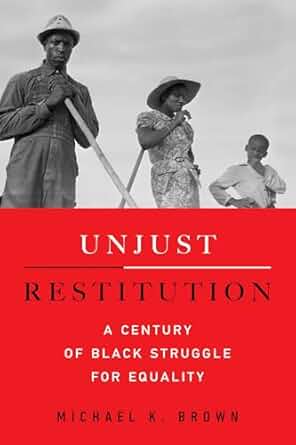
The Book
Unjust Restitution: A Century of Black Struggle for Equality
The Author(s)
Michael K. Brown

The United States public has a strong adherence to the value of “equality of opportunity” as a salve to various iterations of inequality. But as Michael K. Brown demonstrates in Unjust Restitution, what exactly entails “equality of opportunity” is not as plain, or universally agreed upon. Brown asks the question, when Americans have proclaimed a commitment to equality of opportunity, what did they actually envision that entailing? And did these commitments meet the expectations of what African Americans have believed was a “just restitution” for their history of exploitation? To do so, Brown explores the periods of Reconstruction, the New Deal, and the Great Society, three periods of government intervention and innovation that seemed to offer a hope of racial justice.
Unjust Restitution particularly offers an analytical history of three agencies in US history: the Freedmen’s Bureau, the Farm Security Administration (FSA), and the Office of Economic Opportunity. On one level, it demonstrates the differing conceptions of equality of opportunity at play during the time periods. For these agencies and those who supported them, equality of opportunity necessitated rehabilitation, namely that the victims of exploitation-African Americans- required aid and supervision to grow their capacity for independence and self-development. This rehabilitation then, would provide for the tools to take advantage of new economic opportunity. African Americans, on the other hand, rejected assumptions about their need to be rehabilitated Rather, their vision of equality of opportunity welded anti-racism and Black economic independence, to create a doctrine of antiprivilege egalitarianism. This vision, owing much to Jacksonian era antimonopoly ethos, centered the abolition of illegitimate barriers to their exercise of autonomy, success, and economic opportunity.
Brown’s work on the agencies from Reconstruction to the Civil Rights Movement demonstrates their successes, obstacles, and ultimately their inability to adequately achieve racial justice. In the case of the Freedmen’s Bureau, while African Americans advocated for subsidized land purchases to establish autonomy, the agency and reformers opted towards enforcing “fair wage labor” contracts. The idea being that free labor, enforced by contract, would achieve the desired goals. During the New Deal, the Farm Security Administration, through policies of loans and supervision, envisioned creating a class of self-sufficient farmers, whereas African Americans continued to seek autonomy through true land ownership. Nevertheless, it was hampered because it operated under Jim Crow rules and Southern white political power. As for the OEO in the War on Poverty, it failed to create policies for autonomous control of community action agencies (CAAs), often forcing Black communities to share power with white segregationists bent on limiting its effectiveness.
A key argument that Unjust Restitution makes is that any policy that has, at its core, a vision of rehabilitation or “redeeming” victims of oppression, is likely to fail to achieve economic justice. In one part, that is due to the underlying cultural assumptions of rehabilitation. Whether it be the Freedmen’s Bureau and freed people, tenant farmers and the FSA, or the War on Poverty and victims of Jim Crow and Northern racism, rehabilitation assumes that oppression has damaged African Americans. Policies are then directed to addressing their supposed deficiencies in order to further integrate them into a market economy. Equally at fault, is that policies of rehabilitation, center the capacity (or lack thereof) of individuals. This focus evades issues of power, conflicts of interest, or other structural impediments to economic freedom, which fundamentally accepts only measured changes to an unjust status quo.
Unjust Restitution makes a compelling argument about the need to reconceptualize what is necessary to truly achieve equality of opportunity. Brown’s work is deeply researched and demonstrates deep attention to the relationship between federal policy and stakeholders in local communities. The work also takes seriously how different conceptions of equality between stakeholders significantly impacts the effectiveness and results of programs to address discrimination, oppression, or inequality. And more importantly, Brown makes it clear that African American communities have long held a broader vision of equality of opportunity than their allies among government or reform communities. While rehabilitative conceptions of equality of opportunity have become the status quo, Brown points to antiprivilege egalitarianism’s own history in American liberal political culture. Recapturing this intellectual tradition may be the key to offering true liberation.
About the Reviewer
DJ Polite is Assistant Professor of History at Augusta University/ He has written pieces for Black Perspectives, Activist History Review, The Washington Post, as well as a chapter in Reconstruction and Empire (Fordham Press, 2022). His research looks primarily on the mutually reinforcing growth of U.S. Jim Crow policies and empire in the Caribbean, particularly Puerto Rico. It explores the ways that the solidification of both relied on each other and cemented secondary citizenship status for African Americans, Puerto Ricans, and especially women of both groups.





